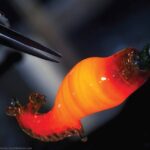Established by Article III of the U.S. Constitution, the Supreme Court first convened in New York City and then moved to Philadelphia before establishing roots in Washington, D.C., in 1801. It occupied various sites, including a private home after the British burned the Capitol during the War of 1812.4 Its current edifice, completed in 1935, befits a great hall of justice, made of magnificent white marble crowned by a monumental portico of 16 Corinthian columns supporting an elaborate entablature.5 And yes, there is a basketball court, better known as “the highest court in the land,” that sits atop the courtroom below. Although the justices continue to shun the use of cameras in the courtroom, they recently consented to the delayed release of audio tapings of oral arguments.
Many compelling medical legal disputes have weaved their way through the appellate courts to arrive on the Supreme Court docket. Some pertain to the meaning of a few simple words, as in the King v. Burwell ACA case, and others are steeped in the interpretation of arcane patent laws regarding the rightful ownership of cutting-edge scientific advances. Let’s study some of these opinions.
Who Owns Our Genes?
In 1994, researchers at the University of Utah in Salt Lake City succeeded in identifying variants on the BRCA-1 and BRCA-2 genes that conferred a heightened risk for breast and ovarian cancer in women carrying either allele. Patents for this discovery were granted, and they were transferred to a newly created diagnostic testing company, Myriad Genetics, which opened adjacent to their campus. (Attention, runners and hikers: their lab sits right below the trailhead to one of the great Utah running/walking trails, the Bonneville Shoreline Trail.) They marketed a novel molecular diagnostic test to women who wanted to determine their risk for developing these cancers. It was a commercial success, attracting a wide audience of concerned patients, including the actress Angelina Jolie, who underwent an elective double mastectomy upon learning the results of her test. Soon, competitors offered similar products, leading Myriad to challenge one of them with a lawsuit claiming patent infringement.
Can a product of nature, a gene, be patented? Technically, yes. A 1911 appellate court ruling determined that a natural product can be patented if it is ‘isolated & purified’ from its surrounding environment.
But can a product of nature, a gene, be patented? Technically, yes. A 1911 appellate court ruling determined that a natural product can be patented if it is “isolated and purified” from its surrounding environment.6 For example, this laid the groundwork for adrenaline, a hormone extracted and purified from the adrenal glands to be patented. This rationale supported the U.S. Patent and Trademark Office (USPTO) decision granting Myriad a patent for its discovery.

